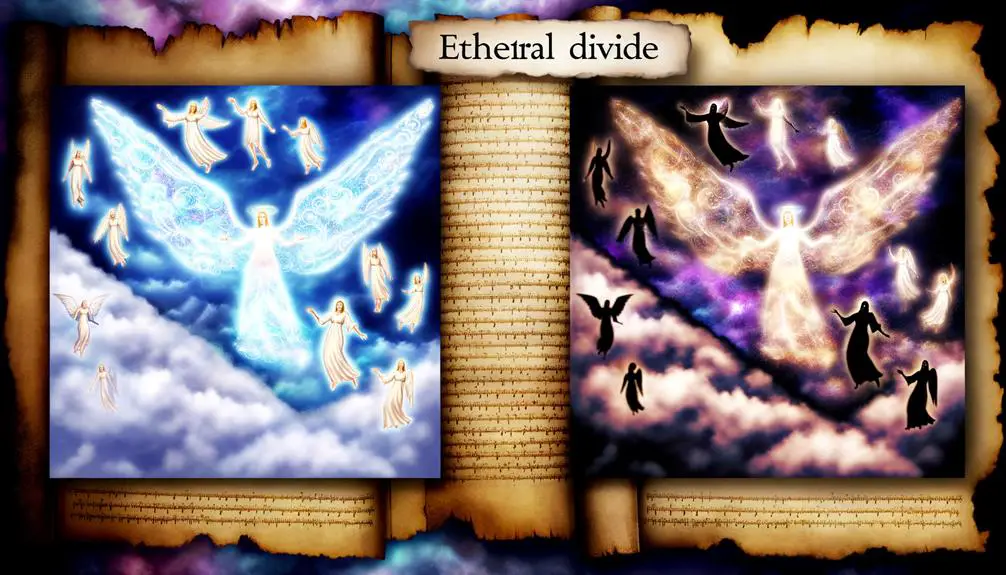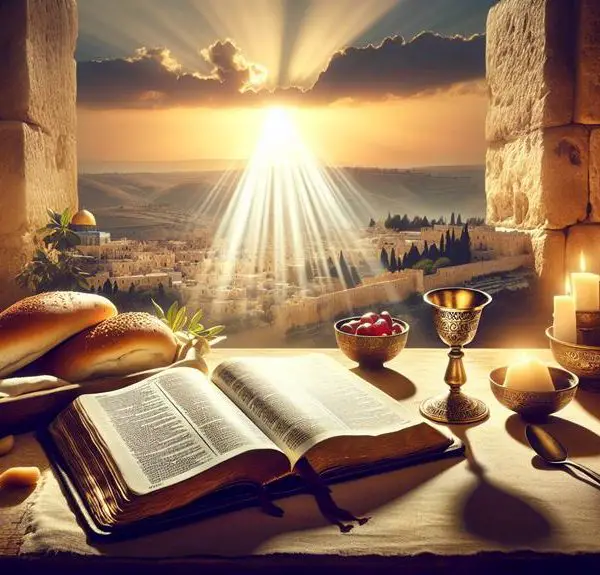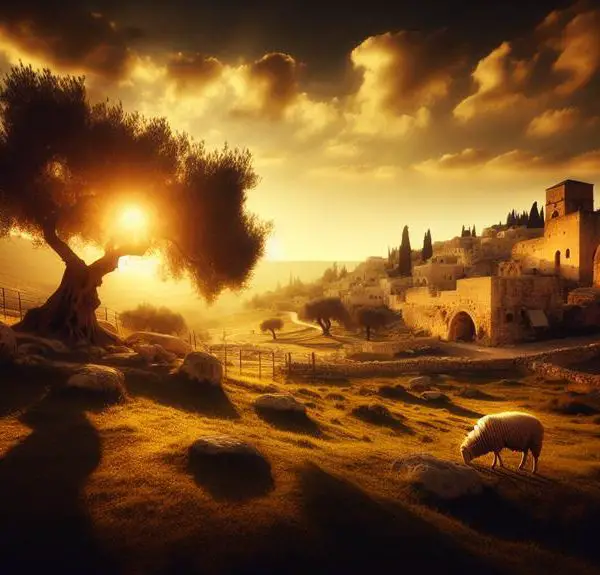Gain insights into the biblical significance of 'realm,' where the divine and earthly merge, beckoning a deeper exploration of spirituality and authority.

Meaning of Realm in the Bible
In the Bible, 'realm' can evoke images of both ancient, dusty kingdoms and the timeless, ethereal domain of the divine, creating a fascinating juxtaposition that bridges the material with the spiritual.
You'll find that exploring these realms isn't just about understanding territories or dominions; it's about uncovering layers of meaning that reveal how the physical and spiritual worlds intertwine. This exploration offers insights into the nature of power, authority, and the divine, prompting questions about how these concepts influence human understanding and experience.
If you're intrigued by how these realms intersect and what they signify, there's a rich tapestry of biblical narratives and teachings awaiting your curiosity.
Key Takeaways
- The term 'realm' in the Bible symbolizes distinct domains, bridging tangible and intangible worlds.
- Earthly realms in scripture reflect divine principles through land distribution, tribal divisions, and kingships.
- The heavenly realm is depicted as eternal, transcendent, and governed by divine will, contrasting with earthly kingdoms.
- Realms of angels and demons illustrate a complex spiritual ecosystem influencing the human experience.
Defining 'Realm' in Scripture

In biblical scripture, the term 'realm' frequently signifies a distinct domain, whether spiritual, physical, or metaphorical, underscoring the multifaceted dimensions of existence and authority within the texts. Delving into its language origins, you'll find that 'realm' isn't directly used in ancient texts but is a conceptual translation suited to convey the layered meanings of scriptural metaphors. This adaptation from the original languages—Hebrew for the Old Testament and Greek for the New Testament—speaks to the translators' efforts to encapsulate the rich, complex ideas presented in the scripture.
Analyzing scriptural metaphors, you encounter the realm concept as a bridge between the seen and unseen, the tangible and intangible. It's a scholarly endeavor to unpack these metaphors, which often serve as a vehicle for spiritual truths. For instance, the Kingdom of God is a predominant theme in the New Testament, representing a realm not of this world but within and among individuals, transcending physical boundaries to highlight a spiritual reality.
Moreover, the portrayal of realms in scripture often intersects with human experience and divine will, offering insights into the nature of God's interaction with humanity. These descriptions provide a framework for understanding the complex relationships between the divine, the moral, and the physical worlds.
In this context, 'realm' becomes a key to unlocking profound theological and existential questions posed within the Bible. It invites you to explore beyond the surface, encouraging a deeper reflection on the spiritual dimensions that scriptural metaphors aim to convey.
Earthly Realms and Kingships

Reflecting on the spiritual and metaphorical dimensions of realms previously discussed, it's essential to also explore how these concepts manifest within the tangible settings of earthly kingdoms and their leadership. The Bible often delineates these earthly realms through narratives of land inheritance, tribal divisions, and the rulership of kings, conveying a structured, divinely ordained social order.
In the context of land inheritance, the distribution of the Promised Land among the Israelites illustrates a profound principle of stewardship and divine allocation. This wasn't merely about acquiring territory; it was about fulfilling God's covenant, a tangible expression of His promise to Abraham and his descendants. Every tribe received a specific portion, except the Levites, whose inheritance was the Lord Himself, emphasizing a different kind of realm where spiritual service outweighed earthly possession.
Tribal divisions further underscore the complexity and specificity of God's plan for His people. Each division:
- Signified a distinct community with its leadership, roles, and responsibilities within the larger Israelite society.
- Represented the fulfillment of Jacob's blessings to his sons, echoing prophetic destinies that would unfold within these divisions.
- Illustrated how God's sovereign design for order and governance was intricately tied to familial and tribal identities.
Kingships in the Bible, especially those of Saul, David, and Solomon, reveal the integration of divine authority with earthly governance. These kings were seen as God's appointed leaders, tasked with ruling justly, upholding God's law, and guiding the people in ways that honored their covenant relationship with Him. Their reigns exemplified how earthly realms could reflect divine principles when aligned with God's will, albeit imperfectly.
Through these lenses, the Bible's narrative on earthly realms and kingships offers a rich tableau of how divine sovereignty intersects with human history, governance, and societal organization.
The Heavenly Realm Explained

How does the concept of the heavenly realm unfold within the biblical narrative, and what significance does it hold in contrast to earthly kingdoms?
In the Bible, the heavenly realm is depicted as a transcendent dimension of existence, far removed from the tangible and temporal confines of earthly life. Unlike earthly kingdoms, governed by human rulers and subject to corruption and decay, the heavenly realm is portrayed as eternal, immutable, and governed by the divine will of God. It's a domain where spiritual dimensions intersect with the physical world, yet remain distinctly separate and supreme.
The heavenly realm is inhabited by celestial beings, entities that serve as messengers and servants of God's will. These beings, while occasionally intersecting with earthly affairs, belong to a spiritual echelon that transcends human understanding and physical laws. This realm is characterized by its purity, holiness, and direct connection to the divine, offering a stark contrast to the often tumultuous and morally ambiguous nature of earthly kingdoms.
In the biblical context, the heavenly realm serves as a reminder of the ultimate authority and sovereignty of God over all creation. It underscores the temporary nature of earthly power and the eternal significance of spiritual truths. The depiction of this realm invites believers to look beyond the immediate, material world and consider the broader, spiritual dimensions of existence. Through this lens, the Bible encourages a perspective that values spiritual integrity and divine alignment over worldly achievement and temporal authority.
Realms of Angels and Demons

Delving into the biblical narrative reveals distinct realms occupied by angels and demons, each serving as a testament to the complex spiritual ecosystem that operates beyond human sight. You'll find that scripture delineates these entities not merely as good versus evil, but as part of a broader, intricate design involving angelic hierarchies and demonic influences.
Angelic hierarchies, as described in various biblical texts, suggest a well-ordered cosmos where angels serve specific roles. From archangels like Michael, who leads heavenly armies, to guardian angels watching over individuals, these celestial beings operate within a structured framework. They're messengers, warriors, and worshippers, each contributing to the maintenance of divine order and the execution of God's will.
Demonic influences, on the other hand, manifest through rebellion against this divine order. Scriptures recount how demons, led by figures such as Satan, seek to subvert human lives and divine plans. Their realm is marked by chaos, deception, and destruction, aiming to estrange humanity from God.
To better understand these spiritual entities, consider the following aspects:
- *Angelic beings aren't omniscient or omnipotent but act according to divine will.*
- *Demons attempt to mimic divine power through deception and manipulation.*
- *The struggle between these realms has direct and indirect impacts on the human experience.*
This analysis underscores the biblical portrayal of a universe where spiritual warfare is omnipresent, with humanity caught in the balance. It invites you to contemplate the significance of angelic hierarchies and demonic influences within your own life, acknowledging the unseen forces that shape the spiritual landscape.
The Realm of God's Kingdom

In exploring the biblical narrative, it's essential to understand that the realm of God's Kingdom transcends our physical universe, embodying an ultimate divine order. This spiritual domain, characterized by divine sovereignty, operates beyond our tangible reality, governed by principles that reflect God's perfect will and purpose.
The Kingdom parables, as told by Jesus, offer profound insights into the nature of this realm. Through stories of seeds growing secretly (Mark 4:26-29) or a mustard seed becoming a large tree (Matthew 13:31-32), you're invited to grasp the Kingdom's dynamic and expansive nature. These parables aren't just quaint stories; they're theological revelations, unpacking how God's rule breaks into human history, often in ways that defy our expectations.
Moreover, the concept of divine sovereignty is central to understanding the realm of God's Kingdom. It suggests that God's authority is absolute and unchallengeable, extending over all creation. This sovereignty isn't tyrannical but is expressed through love, justice, and mercy. It's a reminder that, despite appearances to the contrary, God's rule is ultimately benevolent and aimed at restoring all things to a state of harmony and peace.
As you delve deeper into the biblical texts, it becomes clear that the realm of God's Kingdom isn't merely a future hope but a present reality, albeit in a form that's often hidden or unrecognized. It challenges you to rethink your notions of power, authority, and kingdom, aligning them more closely with God's vision of redemption and renewal. In this light, the realm of God's Kingdom is both a profound mystery and a beacon of hope, guiding humanity towards its ultimate purpose in God's grand narrative.
Frequently Asked Questions
How Do Modern Theologians Reconcile Scientific Discoveries With the Biblical Descriptions of Different Realms?
You're diving into how modern theologians navigate the waters between scientific discoveries and biblical narratives. Through scientific theology, they meticulously analyze and integrate fresh insights without dismissing the spiritual essence.
Additionally, interfaith dialogue plays a crucial role, fostering a broader understanding across different belief systems. This approach doesn't just reconcile differences; it enriches faith with a deeper appreciation of the universe's complexities, blending ancient wisdom with contemporary discoveries in a harmonious narrative.
In What Ways Has the Concept of Realms Influenced Christian Art and Literature Throughout History?
You'll find that Christian art and literature have been deeply influenced by the concept of realms through history.
Gothic architecture, with its sky-reaching spires, symbolizes the heavenly realm, aiming to draw your gaze and spirit upwards.
Symbolic motifs, like the use of light and darkness, further explore these realms, offering a visual narrative of the spiritual journey.
This interplay between the physical and spiritual realms enriches the cultural tapestry, inviting deeper reflection.
Are There Any Biblical Realms That Have Been Reinterpreted or Understood Differently by Various Christian Denominations Over Time?
Yes, over time, biblical realms have been seen through various lenses, shaped by denominational interpretations and historical contexts. You'll find that concepts like Heaven, Hell, and the Kingdom of God have morphed, reflecting the diverse beliefs within Christianity.
Each denomination has woven these realms into their theology, often leading to rich, yet divergent, understandings. This analytical journey through scripture reveals the fluid nature of religious interpretation, highlighting the depth of spiritual discourse.
How Do the Realms Described in the Bible Compare to the Concept of Realms or Dimensions in Other Religious Texts and Traditions?
You're diving into how realms in the Bible stack up against concepts in other religious texts. It's a rich field, ripe for interfaith dialogues. Consider cosmic dualism, seen across many traditions, as a starting point.
This comparison isn't just academic—it's about understanding the depth and breadth of spiritual dimensions. By analyzing these parallels and differences, you're contributing to a broader, more nuanced conversation about the spiritual architecture that shapes our beliefs.
What Role Do Dreams and Visions of Realms Play in Personal Spiritual Experiences According to Biblical Accounts?
In biblical accounts, dreams and visions of realms are pivotal for personal spiritual experiences. They're not just fantastical stories; they carry deep meanings through dream interpretation and visionary symbolism.
These experiences serve as divine messages, guiding, warning, or revealing truths to individuals. You'll find that analyzing these narratives isn't just about the supernatural; it's about understanding the complex ways in which the spiritual intersects with the personal, offering insight and direction.
Conclusion
In concluding, it's pivotal to understand that the concept of 'realm' within Scripture encompasses diverse dimensions, from earthly kingdoms to celestial domains.
Intriguingly, the Bible references the term 'kingdom' over 300 times, underscoring the profound significance of realms both seen and unseen.
This exploration through an analytical lens reveals the intricate tapestry of authority, spirituality, and cosmology embedded in biblical texts, inviting believers and scholars alike to delve deeper into the realms that define the essence of divine narrative and human experience.



Sign up